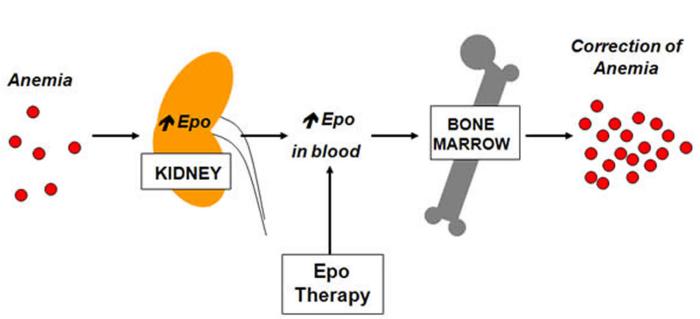With a patient that is administered an injection of erythropoietin – Erythropoietin therapy, a medical intervention involving the administration of erythropoietin, has emerged as a transformative treatment for patients battling anemia. This comprehensive guide delves into the physiological effects, administration protocols, monitoring strategies, and patient education aspects of erythropoietin therapy, providing healthcare professionals with a thorough understanding of its clinical applications.
Erythropoietin, a hormone produced naturally by the kidneys, plays a pivotal role in stimulating red blood cell production. Its administration in patients with anemia aims to correct the underlying deficiency, alleviating symptoms and improving overall health outcomes.
Pathophysiology

Erythropoietin, a hormone produced by the kidneys, plays a crucial role in red blood cell (RBC) production. It stimulates the bone marrow to increase the production of RBCs, a process known as erythropoiesis.
When the body senses a decrease in oxygen levels, such as in conditions like anemia, the kidneys release erythropoietin. Erythropoietin binds to receptors on the surface of RBC precursors in the bone marrow, triggering a cascade of events that lead to the maturation and release of RBCs into the bloodstream.
Potential Causes of Anemia Requiring Erythropoietin Administration, With a patient that is administered an injection of erythropoietin
- Chronic kidney disease (CKD): CKD impairs the kidneys’ ability to produce erythropoietin, leading to anemia.
- Iron deficiency anemia: Lack of iron, essential for hemoglobin production, can cause anemia and necessitate erythropoietin administration.
- Myelodysplastic syndromes (MDS): These are a group of bone marrow disorders that affect RBC production, requiring erythropoietin supplementation.
- Cancer chemotherapy: Chemotherapy can suppress bone marrow function, leading to anemia that may require erythropoietin treatment.
Administration
Routes of Administration
- Subcutaneous injection: Erythropoietin is commonly administered subcutaneously into the abdomen or thigh.
- Intravenous injection: In certain cases, such as severe anemia, erythropoietin may be administered intravenously.
Dosage and Frequency
The appropriate dosage and frequency of erythropoietin administration depend on the patient’s individual characteristics, including the severity of anemia, underlying cause, and response to treatment. The dose is typically adjusted based on regular monitoring of hemoglobin levels and reticulocyte counts.
Monitoring and Management: With A Patient That Is Administered An Injection Of Erythropoietin

Essential Parameters to Monitor
- Hemoglobin levels: Regularly monitoring hemoglobin levels is crucial to assess the effectiveness of erythropoietin therapy and adjust the dosage as needed.
- Reticulocyte count: Reticulocytes are immature RBCs. Monitoring reticulocyte count helps assess the bone marrow’s response to erythropoietin and indicates erythropoiesis.
Potential Adverse Effects
Erythropoietin administration may be associated with certain adverse effects, including:
- Hypertension: Erythropoietin can increase blood pressure, requiring close monitoring and management.
- Thromboembolism: Increased RBC production can lead to an increased risk of blood clots, necessitating preventive measures.
- Pure red cell aplasia (PRCA): A rare but serious complication where the bone marrow stops producing RBCs.
Patient Education

Purpose and Benefits
Patients should be informed about the purpose and potential benefits of erythropoietin therapy, including improved oxygen delivery to tissues and alleviation of anemia symptoms.
Proper Administration and Storage
- Proper injection techniques, including site preparation and needle disposal.
- Storage instructions for erythropoietin, ensuring its stability and potency.
Detailed FAQs
What are the potential adverse effects of erythropoietin therapy?
Erythropoietin therapy may be associated with adverse effects such as hypertension, thrombosis, and seizures. Careful monitoring and appropriate dosage adjustments are essential to minimize these risks.
How is erythropoietin administered?
Erythropoietin can be administered via subcutaneous or intravenous routes. The appropriate route and dosage are determined based on individual patient characteristics and the severity of anemia.